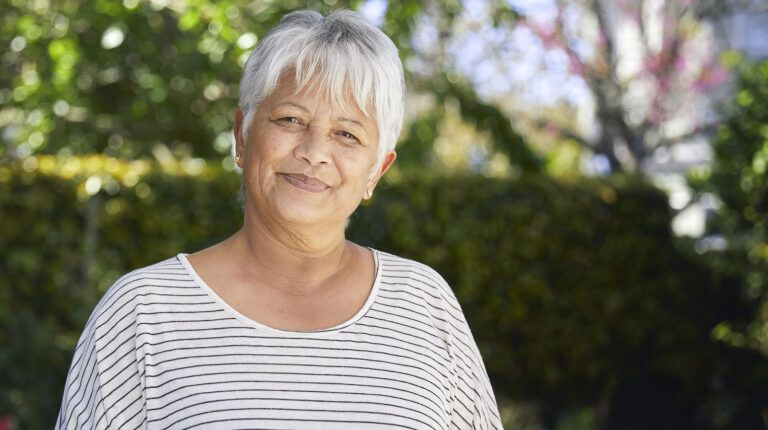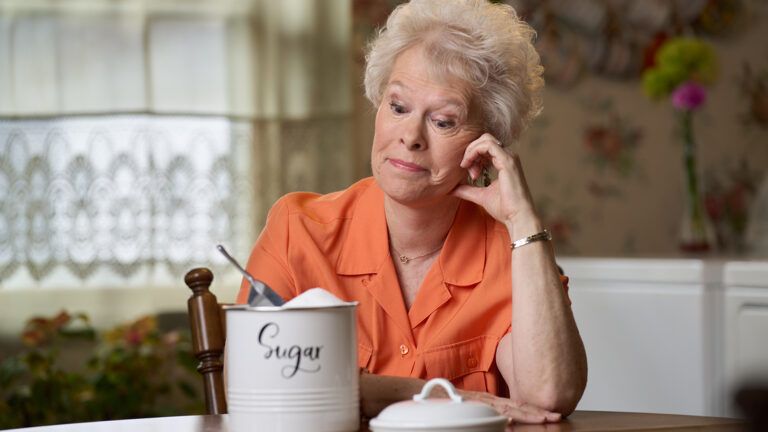Hope: It was a bright spring day. The kind of day my husband, Arthur, and I would have spent hiking in the Adirondacks. But Arthur had died two years earlier, in 2014, and I didn’t hike anymore. I hardly went out at all, except for church, doctor’s appointments and groceries. It was too painful to come home to a quiet house. It felt even quieter and emptier now that our Bernese mountain dog had died too.
Arthur and I were childless, so for the 53 years of our marriage, we were everything to each other. Seeing our old hiking sticks in the garage or the chair where Arthur liked to watch sports on TV made me long for his company. For his bright blue eyes and how they used to tell me, “Honey, I’m glad you’re here.” I tried to keep busy—gardening, reading and writing at my computer. Since retiring from my job as a librarian in a junior high school, I had authored more than two dozen books, most of them for kids. But nothing brought the joy it used to.
None of my immediate family live in New York State. Many friends stopped by, but I missed having a companion. About 15 months after Arthur passed, I met a middle-aged, divorced woman who visited our church. She told me she was praying for a new husband. That wasn’t my goal. I was 81 years old, and I’d already been given a wonderful husband. But I started asking the Lord for a special man friend. Someone who would listen. Someone who would be there for me.
Jerry: My wife’s heart had been failing for more than a year. Norma died in August 2014. After her funeral, I went through the house and gave our three daughters all her things. Later, I asked for one photo back. But that was it. I couldn’t bear any more reminders. I’d known that I would outlive her, but when you’ve been married for 59 years, being on your own is an adjustment. Still, I figured I could handle the solitude. I was tough, a Korean War veteran. I’d always worked alone—first as a farmer, then as a carpenter, even building custom canoes for a while. Besides, I’m not a big talker, especially on the phone.
I hunkered down at home, taught myself to cook and kept my feelings to myself. I thought I was doing okay. But my daughters didn’t. They all live nearby and stopped in often. Maybe they expected to find me out hunting, painting one of my watercolors or working in my shop. Instead, I’d be sitting in my rocking chair watching TV. “Dad!” they’d groan. “At least take it off mute.”
I’d do most of my deep thinking outdoors, sitting by my fire pit, gazing at the flames. I did that a lot after Norma died. One day, a wild partridge came walking up. I went to the house to get a drink, and he followed me there and back to the fire, bobbing his head and making kut, kut, kut sounds. I tried to shoo him away, not wanting him to barbecue himself. That crazy bird not only stuck around but hopped up on my knee. He kept me company for several weeks. He watched while I split wood. He hung out by the fire pit. Then he disappeared, as mysteriously as he had come. I wrote a poem about him. Here are two of the lines: “Whenever he comes, he adds spice to my life. / My friends all say he’s the ghost of my wife.”
Hope: That bright spring day I was reading the paper at my kitchen table when an ad caught my eye—a call for vendors put out by the Carthage, New York, farmers market. Here was something that would get me out of the house, something doable.
The market was open during daylight hours on Fridays, May through October. That worked for me since I don’t drive after dark. I’d be surrounded by people manning booths of fresh produce, baked goods and handmade crafts. I had plenty to sell. Copies of the books I’d written were stacked in my basement. I signed up to become one of the vendors.
The last Friday in May, the farmers market opened for the season. I was in the pavilion unpacking my books when the market director came by—Lori Borland, a woman I knew from years earlier, when Arthur and I belonged to the Adirondack Mountain Club. To my surprise, she asked a favor. Would I read a poem her father wrote and advise him on how to get it published?
Jerry: My daughter Lori suggested I show my poem to a vendor at the farmer’s market, a woman named Hope, who’d had quite a few books published. The second week of the market, I tucked my manuscript under my arm and headed to the pavilion. Near the far end, I saw a lady at a table with neat stacks of books. She had to be Hope. As soon as I introduced myself, she pushed back her folding chair and got to her feet. “I don’t have any customers,” she said. “Let’s go sit at one of the picnic tables.”
I handed her my poem and waited silently as she read it. She gave me a thoughtful critique. We talked about meter and rhyme, and she suggested some word changes. A couple of them I said okay to. Some I didn’t like. “That word won’t work,” I said. “It has to say what I mean.” She nodded.
Then I asked her a couple of questions. The next thing I knew, she told me her whole life story. This is one very lonely lady, I thought. Maybe I could help her.
I’ve always prided myself on my sense of humor. What if I started coming around just to talk? See if I could make Hope laugh, make her feel better?
Hope: The first thing I noticed about Jerry were his eyes—a sparkling blue, just like Arthur’s. The second thing I noticed were his overalls. They reminded me of my dad. (I’d grown up on a farm.) The third thing was his way with the written word. I was impressed with his poem. It went somewhere. He was telling a story with a beginning, middle and end.
Speaking of stories, I didn’t mean to tell him so much of mine. But Jerry was a good listener. He didn’t seem put off by my talkativeness. Still, I wondered if he would come back.
The next week, he did—and the week after. He’d arrive promptly at 9 a.m. and stay three hours. We worked on his poem and talked. He brought me gladiolas. He took me out for a thank-you dinner. He even joked I should come over to chat by his fire pit. Was there more to this than improving his writing?
Then one Friday, 9 a.m. came and went. No Jerry. I couldn’t concentrate on my reading. I kept checking my watch. Maybe all he wanted was help with his poem, and he isn’t one bit interested in me. Maybe I’ll never see him again.
Jerry: I’d run into a friend and stopped to visit. That made me late getting to Hope’s table. I saw her sitting there, her eyes anxiously scanning the crowd. When she spotted me, her face lit up. Uh-oh. As good as that made me feel, it also scared me. Things were moving too fast.
I wanted to help Hope, not romance her. We were so different. I liked watching TV. Hope didn’t even have cable! She’d rather work on her writing or read. And then there was religion. She’s a devout evangelical Christian. I’m a Methodist but not much of a churchgoer. I really liked talking with Hope and didn’t want to hurt her—just tap the brakes a bit.
Hope: To my delight, Jerry did show up that day—he apologized for being late—and every Friday after that. Our conversations were the highlight of my week. I just wished I could be sure he felt the same way. One midsummer Friday, it was quiet at the market. Jerry plopped his elbows down on my table. “When are you coming to my house?” he asked, his eyes looking deep into mine. He was serious this time. My heart leaped. The first chance I got, I drove over to his place.
Jerry lived in a trailer, with an addition on the back. I parked my car in his driveway, checked my hair in the rearview and climbed out. I’d hardly taken five steps before his front door opened. There he stood—bare-chested and holding a beer! “Can I get you one?” he asked. It was a hot August day, but still… was this any way to impress a woman?
Jerry: Hope stared at me, open-mouthed. Finally, she said “No, thanks” and asked for some water instead. I filled a glass at the tap and brought it out to her. Then I went back inside and pulled on a shirt before leading her over to the gazebo.
My gazebo is my favorite place. It stands in a grove of pines my wife and I planted half a century ago. I built it myself. The fire pit too. It’s basically an old bathtub sunk into the ground. Despite the heat, I built a fire as I always do, for atmosphere. Hope sat approvingly in the lawn chair I offered.
Hope: Jerry’s behavior gave me second thoughts. Yet I enjoyed talking with him so much that I couldn’t resist our fireside chats. By October, I’d been visiting him once a week for three months. The air had a bite in it now, and we were still sitting outside. I was confused. Why didn’t Jerry invite me inside his house?
Jerry: I was in no big rush. I didn’t want to be too forward until I felt confident this relationship was going to work out. I definitely didn’t want Hope to get hurt, and I didn’t want to get hurt either. In the meantime, the more the two of us talked, the deeper we got. We talked about everything, even religion. Our relationship was like a windblown seed that settles in the earth and takes root. Neither of us had planned it. It just grew.
My birthday is October 22. I was turning 86, and my daughter Diane was throwing a family party at her house. Should I invite Hope?
Hope: What a surprise! First, Jerry actually called me on the phone. Second, he asked me to his birthday party. My stomach started doing flip-flops. I knew his daughter Lori, but not well. And I hadn’t even met his other daughters, Teri and Diane. Would they resent me and think I was trying to take their mother’s place?
It turned out, I didn’t need to worry. Jerry’s family welcomed me with open arms. The only awkward moment came when his daughters pulled out their phones for pictures. Click. Click. Click. Three photos in quick succession. Jerry alone. Jerry with his three great-granddaughters snuggled on his lap.
Jerry’s granddaughter-in-law sitting on his knee. Then everyone looked my way. “Okay, Hope. You’re next.” Before I could react, Jerry grabbed me and pulled me onto his lap. I was so embarrassed. I’d never sat on anyone’s lap, not even Arthur’s!
The next day, Sunday, I went to church. “Hey, Hope!” the greeters said to me. “We saw your picture on Facebook last night.”
I froze. “What did I look like?” I asked them.
“You looked happy!” they said.
Jerry: Soon after that, I invited Hope inside. Every week that winter, we sat in my house to talk. Strangely enough, that wasn’t how we turned a corner. That happened on the phone. Hope called, and I answered. “Good evening, Twinkle Toes!” I said. Caught off guard, she laughed. Really laughed. Right out loud!
Hope: Every time I left Jerry’s house, he’d take my hand and walk me to the door. Isn’t he ever going to kiss me? I wondered. As I was leaving one day, I brushed my lips against his cheek. “I’ve been wanting to do that for a long time,” I said and ran out the door.
Jerry: One quick side-of-the-face kiss and she was gone. But I smiled to myself. I believe she’s looking for more.
The next time we got together, I asked Hope, “Do you remember how to do this?” Then I bent her backwards and smacked her big.
Hope: That kiss changed everything. Finally, I knew where we stood.
More than 18 months have passed since then, and Jerry and I are a happy couple. We talk on the phone every morning and night. He still likes to say “Good evening, Twinkle Toes!” I respond with “Hello, Prince Charming!” We get together several times a week and have a lot of fun. We’ve gone on picnics and made friendship rocks (you paint pictures or words on rocks and hide them for others to find). We’ve gone tubing, snowshoeing and four-wheeling. Just the other day, Jerry took me mucking about in the swamp, picking cowslips for homemade wine. Adventures I never dreamed I’d be having, let alone in my eighties. But the greatest adventure of all has been finding love again. The Lord answered my prayer and then some.
For more inspiring stories, subscribe to Guideposts magazine.






